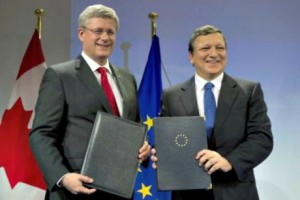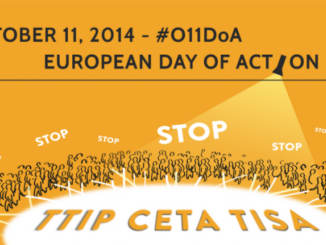
Will the Free Trade Agreement between the EU and Canada (CETA) set the precedent for the TTIP? Many observers have indicated that CETA serves as a trial run for the larger trade and investment deal between the EU and the US, TTIP. EU Trade Commissioner, Karel de Gucht has even described CETA as a template for TTIP.
The CETA text leaked last week has been criticized for its chapter on Dispute Settlement (ISDS) that has largely remained unchanged in the face of growing public concern. The Commission consultation on the ISDS received over 150.000 responses. The leaked text of a EU-Canada free trade deal confirms fears that multinationals may sue EU states in special tribunals for enacting laws that upset their profit forecasts and civil society organisations are questioning the public consultation on a free trade deal with the US.
It is still difficult to see how this will affect issues relating to food and agriculture. Although CETA may serve as a template for TTIP there are some differences, especially relating to Geographical Indications. Issues relating to SPS (read: food safety) are difficult to read out of the leaked text until all annexes are made public. What does seem apparent from the text and preliminary analysis are three key areas: Beef and hormones; public food procurement; and legislation on GMOs.
Beef and Hormones
Currently the Canadian beef industry has very little access to the European beef market – total imports of Canadian beef are less than 1 % of Europe’s total consumption (8 million tonnes per year) with current import duties running as high as 140%. In addition, the EU currently bans imports of beef treated with growth hormones and other growth promoters, which are commonly used by Canadian producers. CETA would mean a substantial increase in duty-free access to the EU market from 3,200 tonnes to 37,500 tonnes. The key question relates back to the SPS chapter i.e. will there be a change in the current ban on beef raised using hormones or other growth promoters. Ideally, the opening of the EU export market would provide an incentive to Canadian beef producers to produce “hormone free” beef if the EU continues to enforce its directive against the use of growth promoters.
GM Crops
In the leaked text, there is no provision that specifically allows for trade in GM food crops. Both the EU and Canada maintain zero tolerance for the imports of GM foods that have not been approved by respective domestic regulatory agencies. It is here that a certain amount of uncertainty remains, and that the main concern is how future legislation on GM crops will evolve. At face value it looks like the main feature affecting legislation on GM crops is that CETA establishes a biotechnology working group in order to shorten the timelines for the approval of genetically modified crops for cultivation in the EU, to strengthen ‘science-based’ regulation and to revise the ‘low-level presence’ policy for non-GMO imported commodities. In short, this means that CETA could put additional pro-GMO pressure on the EU regulatory process.
Public Food Procurement
From a EU perspective public procurement is on the areas for opening market access. Current EU rules on public procurement do not allow preferential treatment to local suppliers, even though municipalities and regional governments are exploring how public food procurement can be used to give small and medium size farmers and food producers alternative market access to local and regional markets. In both Canada and the US “buy local” schemes are used an economic instrument for developing local economies. Public procurement (Government) procurement, especially for schools and other public institutions, are seen by farmers as an important alternative marketing channel, opening possibilities outside the dominant centralized supply chains controlled by supermarkets. In general, the purpose of CETA (and other recent bilateral trade agreements) is to give ‘the other side’ the right to bid to provide any goods or services purchased by governments. For the first time, such market access provisions will be applied to all levels of government, including universities, prisons, schools and hospitals. In principle, this could be a threat to municipal or provincial government or academic institutions’ local procurement of food or food services. Both CETA and TTIP include exemptions for all procurement of agricultural goods for “food programmes” in agricultural policy. The CETA agreement has increased substantially the threshold amounts contracts that come under rules for government procurement. This post is based on a first scan of the leaked treaty and reactions to it. In the coming weeks, we will report in more detail how this trade deal will affect food and farming, and how this will predict the coming TTIP agreement. So please stay tuned!






2 Trackbacks / Pingbacks
Comments are closed.